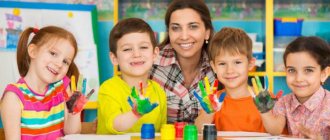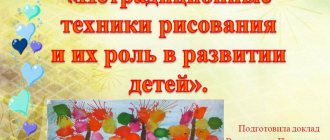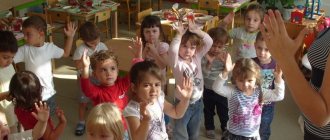Pedagogical experience of a kindergarten teacher. Analysis
Pedagogical experience as a preschool teacher
I believe that kindergarten is a second home for a child.
Not just a house, but a fabulous, interesting one, where love and friendship always reign. In this house for the kids there will always be something mysterious, unexplored, and fascinating. And in order for the child to be interested, we teachers need work experience, professional achievements, knowledge, patience and love for children. Then we can achieve absolute harmony between the child and the teacher. The goal of my work in kindergarten is the comprehensive development of preschool children through various types of children's activities. Objectives: - protecting and strengthening the physical and mental health of children, including their emotional well-being; - Creating conditions for active practical and intellectual activity of the child, forming friendly relationships - Actively involving children in various types of children's activities: ( musical, visual, theatrical, play
) - Raising children in the spirit of a value-based, humane attitude towards nature and man;
— Creative organization of the educational process — Providing advisory and methodological assistance to parents in the upbringing, training, and development of children. I implement my activities through pedagogical technologies: Personality-oriented technology . The basic principle of this technology is aimed at a trusting relationship between the teacher and children. Creating comfortable, conflict-free and safe conditions for the development of students. It is imperative to take into account the psychological characteristics of children and find an approach to each child. health-saving technology through a variety of children's activities. Dynamic pauses during educational activities, gymnastics for fingers and eyes, breathing exercises, walks in the fresh air, sporting events, invigorating gymnastics after sleep, hardening procedures. Game technology is implemented through game training, theatrical, didactic, and plot-based games. Project activities in working with children are collaborative in nature: children, parents and teacher. Project activities include a variety of children’s activities: search and research, creative, cognitive activities. Educational projects have been developed and successfully implemented: “Wintering Birds”, “Broad Maslenitsa”, “New Year”, “Road Rules”, “My Favorite City Tula”. The use of such technology taught me to clearly set goals and objectives, determine ways to achieve them, and plan the end result. I am actively introducing information and communication technologies : since the accompaniment of multimedia presentations in educational activities, with music, moving figures, bright pictures helps the child to create conditions for the pedagogical process in a much more interesting way. The use of all these pedagogical technologies in my teaching helps me make the process of solving problems orderly, consistent, thoughtful and conscious, allowing me to achieve the planned result. The pedagogical diagnostics I conducted showed positive dynamics in the development of children in all areas of educational activity. This diagnostic is carried out at the beginning and end of the academic year, which allows you to track the dynamics of mastering the educational program. When planning organized educational activities, I rely on the structure of a developmental lesson: 1) creating a problem situation; 2) identification of a significant problem; 3) putting forward a hypothesis; 4) management of independent search for children; 5) conducting reflection. Educational activities are organized in various forms of work with children: Quest game, integrated activity, lesson using psycho-gymnastics. I pay a large role in my activities to the individual process of educational activities. During individual lessons, I try to consolidate the material covered, using gaming technologies, problem situations that the child can independently solve. To visually help the child, I offer cards, stencils, tablets, and geometric sets. Independent children's activities are very important for a child's development. During independent play activities, children's interest in the world around them increases. We must not forget that the leading activity in the preschool period is play. Play for a child is an emotional release. In order to increase professional competence on the problem of developing abilities, I chose the topic of self-education: “ Moral and patriotic education of older preschoolers through the formation of love for the small Motherland
.”
Goal: Increasing professional competence with systematizing knowledge on issues of moral and patriotic education of older preschoolers through love for the small Motherland Objectives: 1. To form feelings of attachment to your home, kindergarten, friends in kindergarten, your loved ones. 2. To form a feeling of love for your native land, your small homeland on the basis of familiarization with your native nature, culture and traditions. 3. Form ideas about Russia as a native country. 4. Foster patriotism, respect for the cultural past of Russia 5. Foster civic-patriotic feelings through the study of state symbols. The success of my work in developing children’s abilities is confirmed by the presence of positive dynamics based on the results of pedagogical diagnostics. In my work, I assign a special role to close cooperation with the parents
of my students.
I pay great attention to finding new forms of work to attract parents to participate in the educational activities of children. Work with parents is based on the principle of a trusting relationship between teacher and parent. Such forms of work as sports festivals and research projects have been positively recommended. The parents of the group, together with their children, actively participate in various competitions and exhibitions: the annual exhibitions “Come Visit Us, Autumn”, “New Year’s Carnival of Christmas Tree Decorations”, “Postcards to a Veteran”; social actions; “Let's feed the birds in winter”, “I follow traffic rules”, municipal level competitions dedicated to “Police Service”, “I Draw Victory”. In the hallway there are always visual materials, consultations, moving folders, and children's work. I pay great attention to organizing the subject-spatial development environment
of the group.
The group is divided into centers: cognitive-research, productive - creative activity, health, recreation area. The organization of the developmental environment in the group complies with the requirements of the Federal State Educational Standard. Free access to games, manuals, and books allows you to effectively develop the individual characteristics of each child. I summarize and disseminate my own teaching experience at different levels.
I have a personal blog on a social network where a portfolio and teaching materials are posted: Educational and Methodological Office (), Academy "ART - Talent", my own website on the Multilesson platform.
We recommend watching:
Familiarization of preschoolers 5-7 years old with nature in kindergarten Experience of working as a kindergarten teacher. Educational innovations Kinesiology in kindergarten Experience as a preschool teacher. Paper crafts to prepare preschoolers for writing
Similar articles:
From work experience. Nurturing a culture of verbal communication in preschoolers
The main tasks of obtaining, generalizing and implementing advanced pedagogical experience
The collection, synthesis and application of the knowledge and skills of educators pursues the following objectives:
- Accumulation of a large amount of important, necessary and promising material that can be used for your own purposes.
- Clarification and processing of received facts.
- Identification of connections between pedagogical methods and methods.
- Increasing the quality of educational and educational work.
- Increasing the professional level of the teacher.
- Formation of the creative direction of the teacher’s activity.
It is believed that those educators who pay a lot of attention to summarizing the work done turn into the most creative teachers with a high professional level.
Both educators at all levels, as well as a senior educator (methodologist), the head of a preschool educational institution, teachers of music and physical education, swimming, speech pathologists, speech therapists, and psychologists can generalize their skills. This work can be done together, for example, by combining the experience of two or more teachers working with the same age group of students. You can also generalize the work of a preschool educational institution employee with the student’s family, with other specialists, for example, with a speech therapist or psychologist. It is also possible to generalize the accumulated data on the work of an entire kindergarten. The most relevant topics are selected, for example, on organizing project activities for preschoolers in order to develop a creative personality and hidden talents.
Difficulties in choosing a topic and processing material
When working on their own improvement, a teacher may encounter the following pitfalls:
- Difficulties in selecting appropriate topics. The relevance of the teacher’s development direction and his personal interest should help here. He should pay attention to his students, understand what needs to be introduced into the process of education and upbringing to improve work with them. It is also worth focusing on the requirements and recommendations of the Federal State Educational Standard, existing methodological developments and documentation.
- Finding and selecting the necessary materials. Here you can use teaching aids available in the preschool itself, in library collections, in the works of colleagues, as well as on various pedagogical sites and forums on the Internet.
- Difficulties in assimilating the amount of material received. In order to systematize and remember the information received well, you need to use auxiliary tools that simplify and improve the process of fixing materials in memory. These can be mental maps, notes, diagrams. The simplest and most accessible way is abstract note-taking. It allows you to isolate the most important points in the information received, remember them, and then use them as reference points for reproducing the entire volume of acquired knowledge. In addition to visual memory, in this case, purely mechanical memorization of information when recording is also added, and this will facilitate the understanding of complex and voluminous information.
The work of a preschool teacher cannot be a series of drawing up plans and filling out papers, although this plays an important role in the activity. For every teacher at any level, the measure of his professional compliance should be his contribution to the development of pedagogy, self-development and improvement of the creative spirit both in himself and in the children entrusted to him.
Choosing a topic for self-education and pedagogical tasks
Pedagogy cannot stand still. It must take into account modern trends in a rapidly developing world. What was relevant and useful ten years ago may not work at all in today’s conditions, for children living in completely different realities.
In order not to remain stagnant, to progress, to develop their skills, abilities, and improve knowledge, a preschool teacher needs to get acquainted with the latest developments in the field of pedagogy, psychology and education, study the best practices of senior colleagues, and expand their horizons. For this purpose, topics are selected for teachers' pedagogical experiences, which should be of interest to students taking into account their age, have practical value for a preschool institution and for the professional progress of the teaching staff member himself.
The choice of a pedagogical topic for self-education of a teacher involves the use of an integrated approach and the drawing up of a detailed plan. This is extremely important for the success of self-education, although many kindergarten employees consider creating plans a waste of time and effort.
In fact, the plan promotes a systematic approach to improving one’s own work, essentially representing a program for the teacher’s long-term work for a designated period.
When developing a self-education plan, you need to consider the following points:
- The topics of educators' pedagogical projects must be relevant and useful both to the teacher himself in the field of his professional activity, and to his students.
- Connect the topic with the tasks and directions of modern pedagogical science in the field of preschool education.
- Pay attention to the results of the teacher’s work before starting the project.
- When choosing a topic for self-education, record what systems, methods and programs it is based on.
- Justify the choice of methods of interaction between the teacher and preschoolers.
- Plan the use of diagnostics in the topic.
- Provide for the practicality of the chosen topic so that it can be successfully used in the life of a preschool educational institution.
- Include your own methodological developments in the plan.
- Consider the need to analyze the data obtained as a result of the process.
- Include the possibility of using data in your future activities.
The selected topics must be important, relevant, comprehensive, and useful for use in teaching practice. For help in choosing a topic, you can contact the senior kindergarten teacher or make an independent decision. For self-education, you can change topics annually or plan it for several years at once. In this case, it should be voluminous and designed for children of different age groups.



